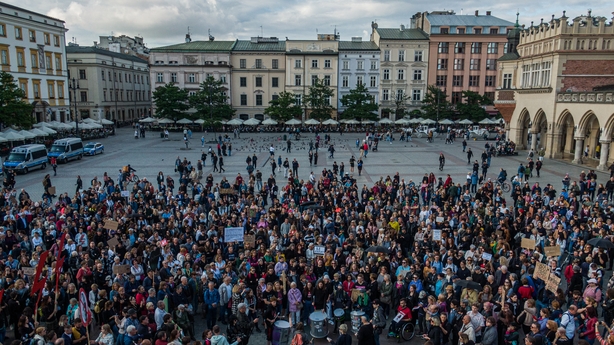Protests took place in more than 40 Polish cities yesterday to highlight the death of 33-year-old Dorota Lalik, who was five months' pregnant and died of sepsis in a hospital in Nowy Targ, southern Poland in late May.
Organisers of the nationwide protests, a collection of Polish women's rights groups, said that Dorota was the fifth pregnant woman to have died in Polish hospitals due to complications since the country’s Constitutional Tribunal introduced a near-total ban on abortion in October 2020.
Approximately 1,500 people turned up for the protest in Warsaw yesterday evening, chanting "not one more". Protests in other cities were reported to have numbered in the hundreds.
Many of those attending the protest in the capital held portraits of Dorota and a number of other pregnant women who had died in Polish hospitals since 2020.
"I'm at an age where I would have children, but I don't want to because I'm scared of the Polish law and the hospitals," Kasia Olejnik, a 32-year-old who works in finance, told RTÉ News.
Zuzanna Skoczek, a 37-year-old corporate consultant, had come to protest, but said she thought that any change to Poland's abortion was still a long way off.
"We would like a radical change, like the Irish one which is the benchmark we should go to," said Ms Skoczek.

Dorota was 20 weeks' pregnant with her first child when her waters broke during the night of 20 May.
She and her husband Marcin travelled immediately to the John Paul II Specialist hospital in Nowy Targ, whereupon doctors informed her that, though the fetus was alive, she had lost amniotic fluids in her womb.
Marcin told reporters from daily newspaper Wyborcza, in an interview earlier this week, that nurses had told Dorota to lie with her legs up in order to increase the chances of water flowing again.
Over the next three days, Dorota’s condition worsened.
Tests conducted two days after she was admitted to hospital showed that Dorota’s CRP level, a protein that indicates inflammation in the bloodstream, was nine times higher than the normal rate.
Jolanta Budzowska, an attorney for the family, told independent broadcaster TVN on Monday that the hospital's medical staff had not provided Dorota with an accurate assessment of her condition, nor explained the medical choices available to her.
In the early hours of 24 May, doctors confirmed that the fetus had died. Dorota died four hours later.
An autopsy, conducted last week by the district prosecutor’s office in Nowy Sacz, determined that Dorota died from septic shock, which is the most severe stage of a sepsis infection, and causes heart failure.
Poland's Ombudsman for Patients' Rights opened an investigation into Dorota’s death on 29 May and, earlier this week, announced that the hospital in Nowy Targ had "violated" the patient's right to health services, "in accordance with current medical knowledge".
At a press conference on Monday in Warsaw, Poland’s Minister of Health Adam Niedzieslski said that every woman in Poland "has the right to terminate her pregnancy in the event that her life or health is in danger".
Poland’s abortion law is one of the strictest in Europe.
In October 2020, Poland’s Constitutional Tribunal ruled that the termination of a pregnancy is only permissible in the case of rape, incest, or when the life of the mother is in danger.
The ruling also banned the termination of pregnancies with fetal defects.
Critics of the current law say that determining when the life of a pregnant woman is in danger often comes down to the views of a hospital's medical staff.
As early as 2005, Nasz Dziennik, a Catholic publication, reported that the then-director of the John Paul II hospital in Nowy Targ – the same public hospital where Dororta died – had said that abortions would not be performed on its premises because it was "against the teachings of the church".
The introduction of the near-total ban on abortion in 2020 by the tribunal of 15 judges, all of whom were appointed by the ruling right-wing Law and Justice government, caused a wave of protests by women’s rights and civil liberties organisations across the country.

Poland is heading into campaign season ahead of a closely contested parliamentary election in October.
Access to abortion remains a sideline issue for many voters in a campaign that has so far been dominated by national security, a cost of living crisis, and the war in Ukraine.
Both Law and Justice and its minor coalition partner, Sovereign Poland, also a right-wing party, support the near-total ban, and align themselves closely with the teachings of the Catholic Church.
The far-right Confederation party, currently polling at 13%, also backs the current ban on abortion.
Civic Platform, the main centrist opposition party, led by former prime minister Donald Tusk, favours the liberalisation of the country’s abortion law.
In August 2022, Mr Tusk said that his party would not run candidates in the election that were not in favour of allowing abortion up to 12 weeks of pregnancy. A group of left-wing parties, now polling at around 6%, also supports abortion up to the 12th week.
Szymon Holownia, the leader of Poland 2050, a smaller centre-right party, has said that he favours a referendum on the issue.
One poll conducted this week by IBRiS for independent broadcaster Radio Zet found that 72% of Poles believe that the country's current abortion laws pose a threat to the life and health of pregnant women.






